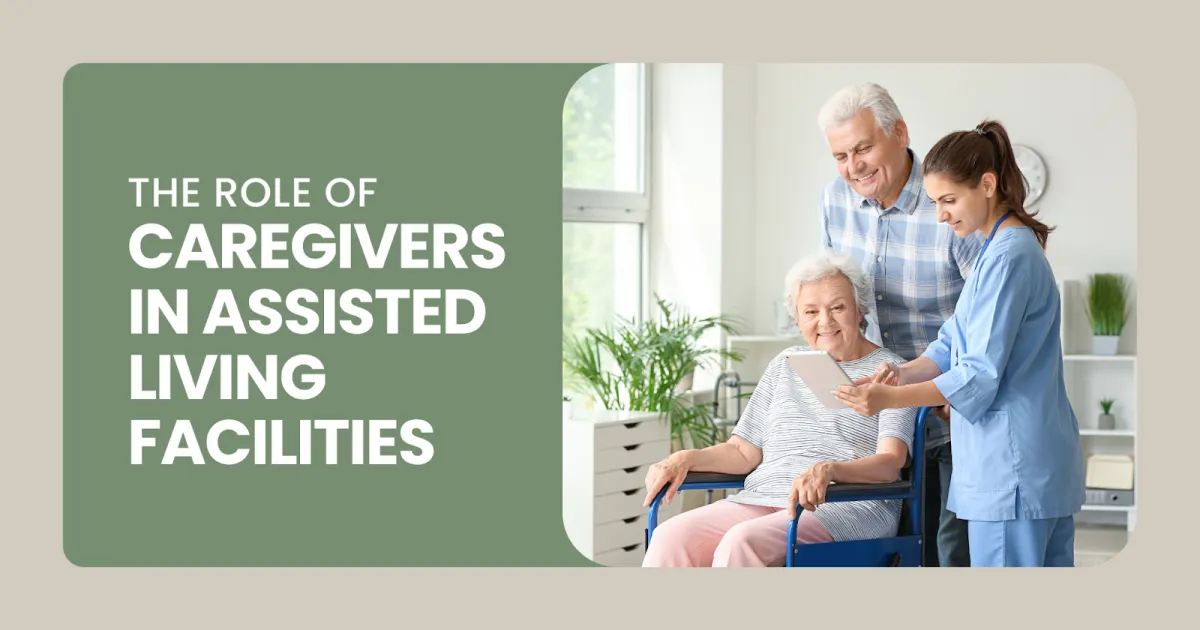
The Role of Caregivers in Assisted Living Facilities
A few years ago, John faced a difficult decision when his mother, Margaret, could no longer live independently due to health issues. After several falls and hospital visits, John moved her into an assisted living facility. What he didn’t expect was how vital the assisted living caregivers would be in his mother’s daily life. They didn’t just help with tasks like bathing and dressing—they also became a source of comfort and emotional support.
John quickly realized that the caregiver responsibilities in assisted living were far-reaching, involving not only physical care but also enhancing his mother’s overall well-being. This experience highlighted the crucial role caregivers play in senior community living, providing the foundation for residents’ health and happiness.
What Do Assisted Living Caregivers Do?
Caregivers in assisted living facilities are the unsung heroes of senior care. They go far beyond providing basic assistance—they're the champions of well-being, safety, and emotional support. These professionals work tirelessly to confirm that each resident feels secure, cared for, and empowered. Their role is vital in creating a supportive environment where seniors thrive with dignity and respect.
Let’s break down the key responsibilities of caregivers and explore why they are the backbone of assisted living.
Personal Care Assistance: The Heart of Daily Life
Assisted living caregivers are essential in helping residents with everyday tasks. Whether it’s assisting with dressing, bathing, or grooming, they confirm that each person feels comfortable, confident, and clean. Their care isn’t just about meeting physical needs; it's about maintaining the resident’s dignity and sense of independence. Every interaction is an opportunity to empower and uplift.
Medication Management: Precision and Care
Managing medications is no small feat, especially for seniors who often take multiple prescriptions. Caregivers in assisted living facilities play a pivotal role in keeping track of medication schedules, ensuring that each resident takes their medications at the right time and in the right doses. This responsibility is crucial in preventing health setbacks and ensuring that residents stay on track with their wellness goals. With their meticulous attention to detail, caregivers help reduce the risks of medication errors, keeping everyone on the path to optimal health.
Mobility Assistance: Promoting Independence
Mobility challenges are a common concern for seniors, but caregivers provide the support needed to maintain their freedom and independence. Whether helping residents move around the facility, assisting with walking, or supporting them during transfers, caregivers confirm that seniors stay active and safe. This hands-on assistance helps prevent falls and injuries while encouraging residents to stay as mobile as possible, boosting both their physical and mental health.
Emotional Support: The Heartfelt Connection
Caregiving isn't just about physical tasks—it’s about forming connections and offering emotional support. Many residents in assisted living facilities face isolation and loneliness, but caregivers bridge this gap with compassion. Through meaningful conversations, shared activities, and attentive listening, caregivers provide an emotional lifeline. They help residents feel heard, valued, and connected, fostering a sense of community that significantly impacts their well-being.
Health Monitoring: Vigilance and Action
Caregivers are on the front lines of health monitoring, keeping a watchful eye on any changes in a resident’s condition. Whether it’s a physical change like weight loss or a shift in mood, caregivers quickly spot potential issues and confirm that medical professionals are informed. Their vigilance prevents small health problems from escalating, ensuring that seniors receive timely care and attention. In this way, caregivers are instrumental in maintaining residents’ overall health and quality of life.
Why Are Caregiver Responsibilities So Crucial in Assisted Living?
In many ways, caregivers are the unsung heroes in assisted living communities. They play an instrumental role in ensuring that the daily lives of elderly residents run smoothly. The level of care provided can be a direct reflection of the quality of life that the residents experience.
Here’s why caregiver responsibilities are so important:
Providing continuity of care: Caregivers establish long-term relationships with residents, offering a sense of stability. They understand each resident’s preferences, habits, and needs, allowing for modified care.
Reducing hospital readmissions: When caregivers monitor residents’ health and help with tasks such as medication management, they can catch early signs of health problems, preventing more serious issues that may require hospitalization.
Promoting social engagement: Social isolation is a common issue for seniors, and caregivers help combat this by encouraging participation in community activities, assisting with socializing, and providing companionship.
Reducing family stress: Families of residents often feel overwhelmed with caregiving responsibilities. Knowing that their loved ones are in the hands of capable caregivers can significantly reduce their stress.
The Impact of Caregivers in Assisted Living on Resident Health
The presence of professional caregivers has a direct impact on the physical and mental health of residents. Good caregivers can significantly improve the overall health outcomes of elderly individuals in assisted living facilities.
Studies have shown that personalized care from caregivers can reduce the chances of serious falls, depression, and cognitive decline. By taking care of residents’ physical needs, caregivers allow them to focus on their emotional well-being and maintain a higher quality of life.
In particular, caregivers are pivotal in helping with chronic disease management, such as diabetes, heart disease, and arthritis. By ensuring residents take medications as prescribed and encouraging regular checkups, caregivers can help manage these conditions and prevent further complications.
The Challenges Caregivers Face
While caregivers provide essential services, their roles come with challenges. These challenges can impact the quality of care provided and the well-being of caregivers themselves.
Emotional strain: Providing emotional support to elderly individuals, especially those with dementia or Alzheimer’s disease, can be emotionally draining. Caregivers often deal with residents who experience confusion, frustration, and sadness, which can lead to caregiver burnout.
Physical demands: Assisted living caregivers spend long hours on their feet, assisting residents with mobility, lifting, and carrying out other physical tasks. The physical toll on caregivers can lead to injuries, exhaustion, and fatigue.
Time constraints: Due to staffing shortages or other challenges, caregivers may not always have as much time as they would like to spend with each resident. This can make it difficult to provide the level of care that each individual deserves.
Understanding these challenges is crucial for families to appreciate the work of caregivers and advocate for better conditions in assisted living facilities.
How to Support Caregivers in Assisted Living
Supporting caregivers is just as important as supporting the residents. Here are several ways to confirm caregivers have the resources and recognition they need:
Offer ongoing training: Caregivers should receive continuous education and training in areas like patient care, safety protocols, and emotional support.
Provide emotional support: Caregivers often experience stress and burnout. Offering counseling and peer support groups can help them manage the emotional demands of the job.
Implement adequate staffing levels: Ensuring that there are enough caregivers to meet the needs of the residents is essential for both the caregivers’ well-being and the quality of care.
Recognize their work: Regularly acknowledging and appreciating the hard work and dedication of caregivers can improve morale and retention rates.
Conclusion
The role of assisted living caregivers is central to the health, well-being, and happiness of elderly residents. These caregivers provide essential services that go beyond just basic care—they are companions, advocates, and health monitors. The responsibility they take on every day is immense, and they are often the unsung heroes in assisted living communities.
In order to maintain a high standard of care, it is vital to acknowledge the challenges that caregivers face and offer them the support they need. Families, facility management, and communities must work together to confirm that caregivers have the resources to provide the best possible care.
FAQs
What do assisted living caregivers do on a daily basis?
Assisted living caregivers help residents with personal care, mobility assistance, and medication management. They also provide emotional support and monitor residents’ health.
How do I know if a caregiver is qualified for assisted living?
Look for certifications such as CNA (Certified Nursing Assistant) or HHA (Home Health Aide). Caregivers should also have experience working in senior community living environments.
What are the benefits of having professional caregivers in assisted living?
Professional caregivers confirm residents receive personalized care, help prevent health complications, and promote social engagement, all contributing to better health outcomes.
Can caregivers assist with medical tasks in assisted living?
Yes, caregivers in assisted living are often trained to assist with tasks like administering medications and monitoring vital signs under the supervision of healthcare professionals.
How can families support caregivers in assisted living?
Families can support caregivers by expressing gratitude, advocating for adequate staffing, and ensuring caregivers have access to ongoing training and emotional support.

Facebook
Instagram